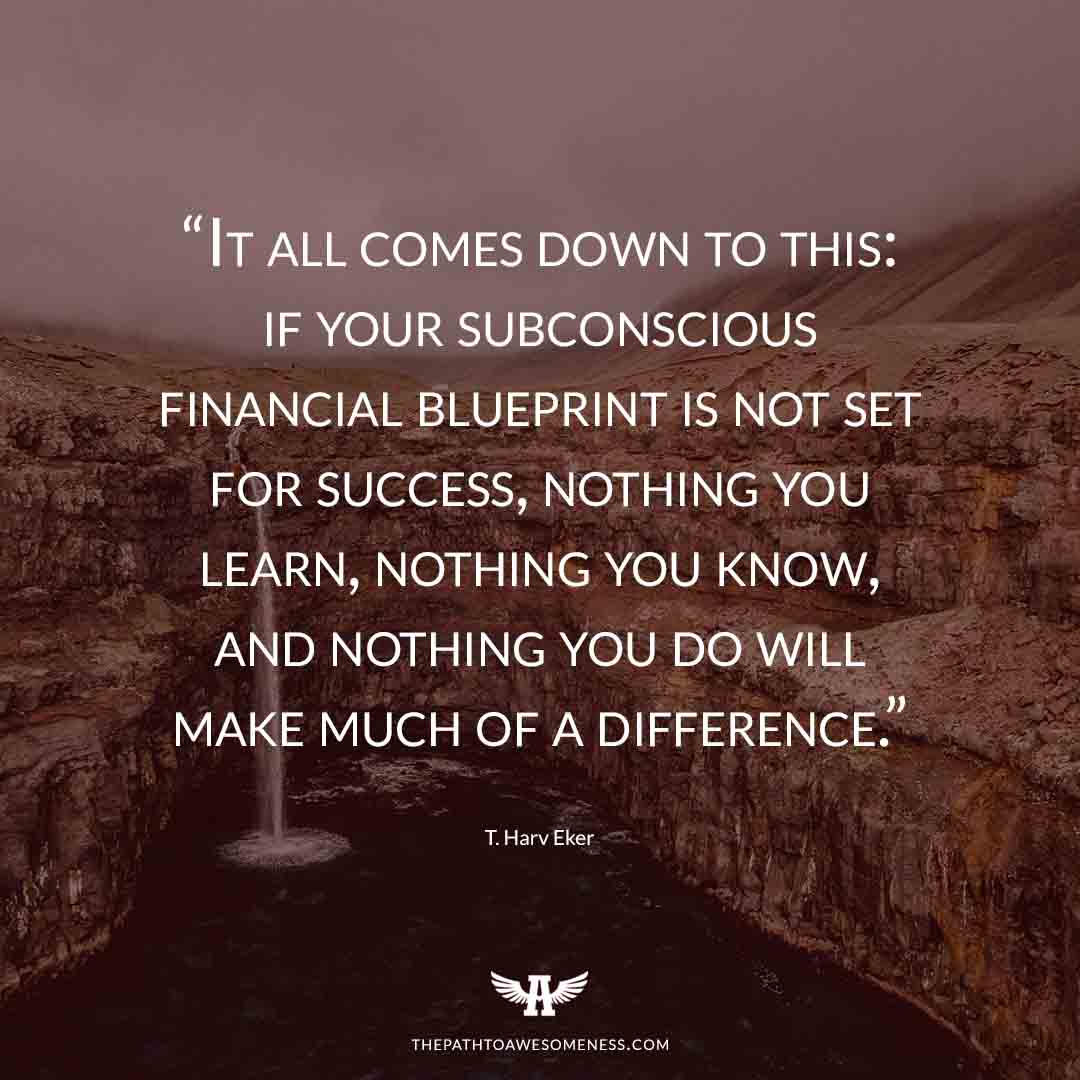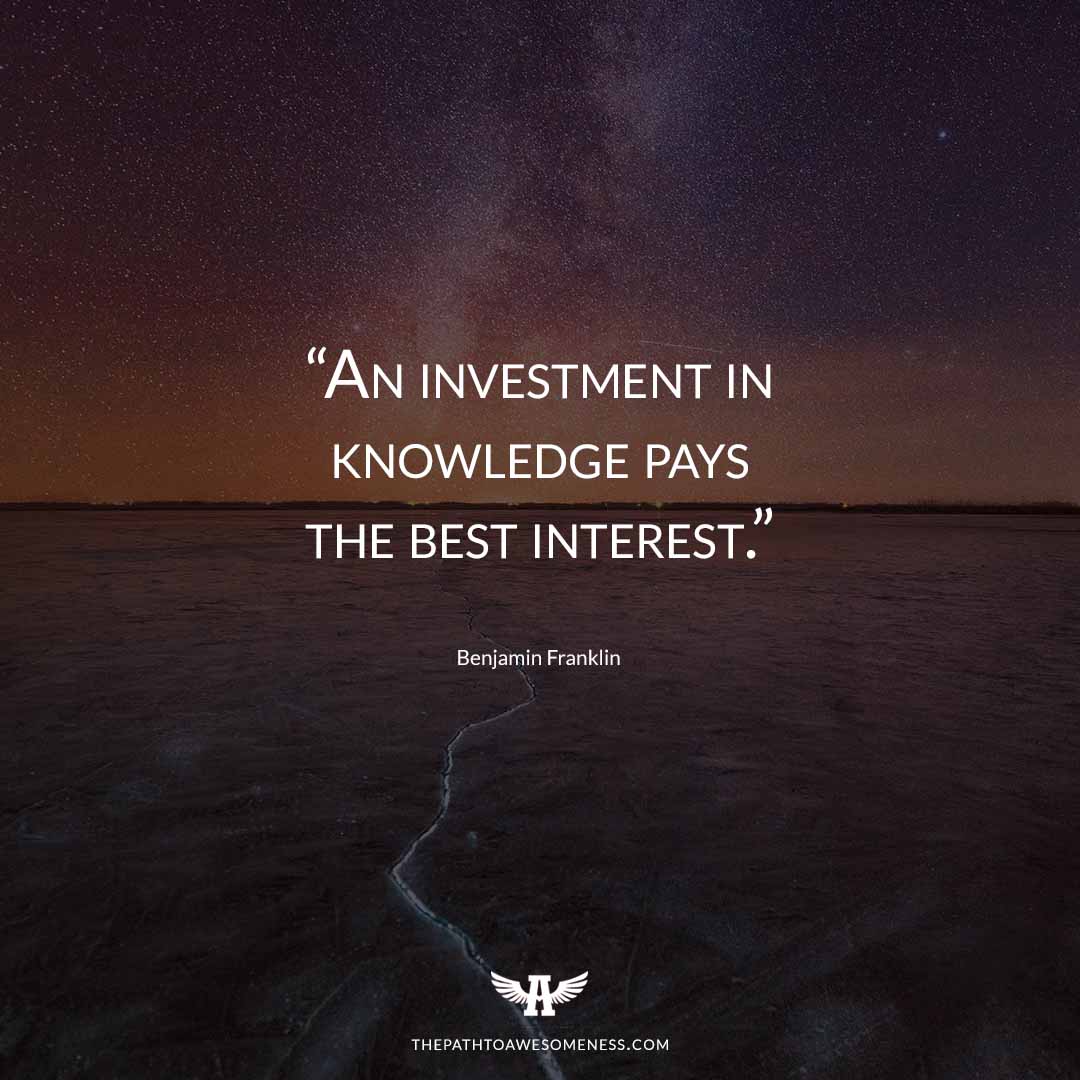
If you want the world to be a certain way, then start with you being that way. If you want the world to be a better place, start with you being better. – T. Harv Eker, Secrets of the Millionaire Mind
It was in the year 2015 when I first heard about T. Harv Eker after popping on my Facebook newsfeed. His advertisement says something along the lines of “You Can Be Spiritual and Be Really Rich.”
Intrigued, I played the video and listened to his husky voice while introducing himself. I remember him saying, “I’m a multi, multi, multi, multi-millionaire…”
So, I attended his free webinar but I’m not sure why I didn’t follow through. Maybe I wasn’t ready yet for what he has to offer. I must have been ought to learn something else first.
And I have. In the following years until 2017, I was struggling financially. I didn’t have a job and the business project I was working on at the time didn’t turn out well.
Thank goodness, I was able to get back on my feet and have been rebuilding my relationship with money since then.
Now that I’ve gained the experience I need, I feel more than ready to hear not just T. Harv’s husky voice, but also what he calls “The Wealth Files” in a millionaire’s mind.
If you’re ready to learn the secrets, so am I.
Let’s be spiritual and become multi, multi, multi, multi-millionaire!
Your Money Blueprint
The fact is that your character, your thinking, and your beliefs are a critical part of what determines the level of your success.
It’s what’s under the ground that creates what’s above the ground. It’s what’s invisible that creates what’s visible. So what does that mean? It means that if you want to change the fruits, you will first have to change the roots. If you want to change the visible, you must first change the invisible.
Money is a result, wealth is a result, health is a result, illness is a result, your weight is a result. We live in a world of cause and effect.
The only way to change your “outer” world is to first change your “inner” world.
Throughout the book, T. Harv highlights important wealth principles. The first you’ll come across sets the tone for how he reveals the secrets of the millionaire mind — with candor and sometimes, tough love.
Here it is: Your income can grow only to the extent you do!
T. Harv wants us to realize that we can have all the tools like business knowledge, money management, and investment strategies. But unless we grow as a person with the right character, right thinking, and right beliefs, none of them matters.
Money is an effect. If you want to change the effect, you have to change the cause – your money blueprint. T. Harv defines it as the program or way of being in relation to money.
He has this formula for it: T -> F -> A = R
Which translates as thoughts lead to feelings. Feelings lead to actions. Actions lead to results. The money blueprint is the combination of the three.
How do you know your money blueprint? Check your thoughts around money. Assess the feelings that come up. What actions are you taking in regard to your finances?
Heed this channeled message from Bashar as a clue: If you’re not doing it, you don’t know it yet.

Money Association
The reason or motivation you have for making money or creating success is vital. If your motivation for acquiring money or success comes from a nonsupportive root such as fear, anger, or the need to “prove” yourself, your money will never bring you happiness.
By unlinking your money motivation from anger, fear, and the need to prove yourself, you can install new links for earning your money through purpose, contribution, and joy. That way, you’ll never have to get rid of your money to be happy.
T. Harv says there are 3 influences that make up your money blueprint.
They are:
- Verbal Programming – the things you heard about money when you were growing up
- Modeling – how people around you, especially within your family, handled financial matters
- Specific Incidents – your past experiences that involved money
The combination of these influences conditions your subconscious mind, which determines your thinking that then determines your decisions; your decisions determine your actions that then eventually determine your outcomes.

Now that you see how crucial your money blueprint is, T. Harv provides the 4 key elements to changing it.
Here they are:
- Awareness – you can’t change something unless you know it exists. As we used to say: no awareness, no change.
- Understanding – by knowing where your way of thinking originates (from the 3 influences), you can recognize that it has to come from outside you.
- Disassociation – realizing your thinking is not you (you are the awareness), you can separate yourself from it and choose differently – based on who you are today and where you want to be tomorrow.
- Reconditioning – rewiring your brain by installing a new set of programs (beliefs) that support you in regard to money and success
You can go to millionairemindbook.com for additional resources so T. Harv can support you further.
It’s On You
You have to believe that you are the one who creates your success, that you are the one who creates your mediocrity, and that you are the one creating your struggle around money and success. Consciously or unconsciously, it’s still you.
The secrets of the millionaire mind that T. Harv refers to are “The Wealth Files” stored in your subconscious mind. And there are 17 wealth files that show how rich people think and act differently from poor and middle-class people.
Here’s Wealth File #1: Rich people believe “I create my life.” Poor people believe “Life happens to me.”
Rich people have a creator mentality, while poor people have a victim mentality. Note the word “mentality” because, in reality, everyone is a creator. Rich people know this truth.
But poor people, T. Harv says, play the role of a victim. Why? Because they’re seeking attention, or more precisely, love that comes from the attention they can get. And to stay a victim, attention seekers make sure they never get rich.
T. Harv points out 3 attitudes of victim mentality:
- Blame – there’s always someone else or something else to blame for their misfortunes. Anything or anyone except for themselves.
- Justifying – rationalizing that “money is not important,” or any other beliefs around money.
- Complaining – focusing on what’s wrong
And so to shift from victim to creator mentality, from being poor to being really rich, T. Harv shares the following:
DECLARATION: Place your hand on your heart and say…
“I create the exact level of my financial success!”
Touch your head and say…
“I have a millionaire mind!”
For all the wealth files, there’s a corresponding DECLARATION (affirmative statements) and MILLIONAIRE MIND ACTIONS you can start implementing in your life.
Play to Win
If your goal is to be comfortable, chances are you’ll never get rich. But if your goal is to be rich, chances are you’ll end up mighty comfortable.
Wealth File #2: Rich people play the money game to win. Poor people play the money game to not lose.
T. Harv emphasizes the power of intention. He says that for most people, the name of the game is survival and security rather than creating wealth and abundance (Wealth File #1).
When your intention is to just have enough to pay the bills, then that’s exactly what you’ll have — just enough.
Even middle-class people play the losing game when they just want to be “comfortable.” And T. Harv argues that being comfortable is not the same as being rich. Far from it.
So, you’ve got to be clear with your intention. Be clear with what you want. Keep in mind and bear in heart the message from Abraham Hicks: You can be, do, and have anything!
DECLARATION: Place your hand on your heart and say…
“My goal is to become a millionaire and more!”
Touch your head and say…
“I have a millionaire mind!”
Think Big, Get Big
Your life is not just about you. It’s also about contributing to others. It’s about living true to your mission and reason for being here on this earth at this time. It’s about adding your piece of the puzzle to the world.
This comes from Wealth File #4: Rich people think big. Poor people think small.
T. Harv talks about The Law of Income as the wealth principle behind it. It states that you will be paid in direct proportion to the value you deliver.
The keyword is value. How much of your value are you offering to people?
In that context, your net worth equates to not how much you have, but how much you give.
In other words, how many people do you serve and how much impact do you have in their lives?
Small-thinking is when you only serve yourself. Big-thinking is when you serve others.
Big-thinking is when you consider others who have the same problems and you think of ways to help them. You think big when you think outside yourself.
T. Harv concludes that thinking big not only leads to money but also meaning — that which truly enriches us.

Bless the Money
Rich people are grateful that others have succeeded before them so that they now have a blueprint to follow that will make it easier to attain their own success. Why reinvent the wheel? There are proven methods for success that work for virtually everyone who applies them.
Consequently, the fastest and easiest way to create wealth is to learn exactly how rich people, who are masters of money, play the game. The goal is to simply model their inner and outer strategies. It just makes sense: if you take the exact same actions and have the exact same mind-set, chances are good you will get the exact same results.
It comes from Wealth File #7: Rich people associate with positive, successful people. Poor people associate with negative or unsuccessful people.
T. Harv says this is the core message of his book, the main secret: be like the rich and successful people.
Model them. You don’t have to reinvent the wheel. It’s been done before and continues to do so today. If you want to be in their place, then it’s common sense to ask them how to get there.
Model their thinking, their beliefs around money, their habits, their actions, and chances are you’d get similar results.
This goes hand in hand with Wealth File #6: Rich people admire other rich and successful people. Poor people resent rich and successful people.
You won’t be something you resent. How can you model after someone you hate?
So, T. Harv asks us to examine the way we relate not just to money but also to people who have lots of money.
He shares the Huna philosophy: “Bless that which you want.”
Here’s the Millionaire Mind Action that goes with it: Whenever you see beautiful homes and luxury cars, bless them. And bless the people who have them.

You’re Worthy
You and you alone determine if you’re going to be worthy. It’s simply your perspective. If you say you’re worthy, you are. If you say you’re not worthy, you’re not. Either way you will live into your story.
Wealth File #10: Rich people are excellent receivers. Poor people are poor receivers.
A lot of money issues revolve around self-worth. It’s probably more obvious in poor people who deem themselves unworthy. But even the rich ones suffer from it. T. Harv says that money becomes an unhealthy motivation if it’s tied to self-worth.
He wants us to rethink the saying, “It’s better to give than to receive.” Both are good! It’s better to give AND receive.
T. Harv has this wealth principle to share with us:
For every giver, there must be a receiver, and for every receiver, there must be a giver.
In one of his channeling sessions, Bashar tells us that we deny others their joy if we don’t accept their gifts.
This goes both ways. The fact that you have something to offer (YES, YOU DO!) means there’s someone on the receiving end.
Giving and receiving are two sides of the same coin.
Both sides are worthy. We all are!

Build Your Net Worth
If your intention is to be a millionaire or more, you must focus on building your net worth.
By tracking your worth, you are focusing on it, and because what you focus on expands, your net worth will expand.
We now get into practical matters. First up is the way we measure financial wealth.
T. Harv makes a clear distinction that by “millionaire,” he’s referring to net worth, not just income.
Income is just one of the factors that comprise net worth. There are four:
- Income – comes in 2 forms: working income and passive income. In his YouTube channel, T. Harv focuses on passive income. His #1 recommendation is to own a business and make sure that you build a business that later on can run without you.
- Savings – what you get to keep from your income; you have to save more than spend.
- Investment – growing your money; making money work for you.
- Simplification – creating a lifestyle in which you need less money to live on; decreasing or maintaining your cost of living to increase your savings and funds for investments
Basically, your net worth is calculated by adding the current dollar value of everything you own (your assets) and subtracting the total value of everything you owe (your liabilities).
Again, you can go to millionairemindbook.com where you can download the net worth tracking sheet prepared by T. Harv. He suggests tracking your net worth statement quarterly (every 3 months). This is based on the spiritual principle that states “what you focus on expands.”
Focus on building your net worth. Track it and it will expand.

Manage Your Money
The single biggest difference between financial success and financial failure is how well you manage your money. It’s simple: to master money, you must manage money.
This is my biggest takeaway from the book – T. Harv’s money management system.
It’s based on Wealth File #14: Rich people manage their money well. Poor people mismanage their money well.
Here’s the key: you have to learn to manage your money NOW even if it’s only a dollar or less. Money management is not about the amount but the habit of managing your money.
T. Harv points out that if you can’t manage less money, you won’t be able to manage more.
The guiding wealth principle is the Universe won’t give you more than what you can manage.
Why? Because how you do one thing is how you do everything.
So, let’s roll up our sleeves and show the Universe we’re ready!
The money management method that T. Harv proposes is a fund allocation system. You put a certain percentage of your money into 6 separate categories called money “jars.”
Recap:
55% – Necessities Account
10% – Long-Term Savings Account
10% – Financial Freedom Account
10% – Education Account
10% – Play or Fun Account
5% – Give Account
Note that the percentage amount is not fixed. I personally modified mine to suit my preferences and I look for ways to automate the funding.
The important thing is you get started and adjust over time. Just start building the habit of managing your money now.
Invest In Yourself
Success is a learnable skill. You can learn to succeed at anything. If you want to be a great golfer, you can learn how to do it. If you want to be a great piano player, you can learn how to do it. If you want to be truly happy, you can learn how to do it. If you want to be rich, you can learn how to do it. It doesn’t matter where you are right now. It doesn’t matter where you are starting from. What matters is that you are willing to learn.
The fastest way to get rich and stay rich is to work on developing you! The idea is to grow yourself into a “successful” person. Again, your outer world is merely a reflection of your inner world. You are the root; your results are the fruits.
T. Harv stresses the importance of investing in yourself so you keep growing as a person. When you grow to become a successful person, you naturally become successful in anything and everything you do.
Rich people know the order to success is Be – Do – Have. They think, “If I become a successful person, I will be able to do what I need to do to have what I want, including a lot of money.”
Poor and middle-class people have it backward, Have – Do – Be. They think the opposite: “If I have a lot of money, then I could do what I want and I’d be a success.”
Last, but not least, Wealth File #17: Rich people constantly learn and grow. Poor people think they already know.
To become a successful person, you must always be willing to learn. Masters never stop learning. Even when they teach, they’re simply learning more.

You must be willing to keep growing beyond your comfort zone. T. Harv says your comfort zone is your wealth zone. The size of your comfort zone is the size of your wealth container. If you want to grow your wealth, then grow beyond your comfort zone.
Nobody ever died of discomfort, yet living in the name of comfort has killed more ideas, more opportunities, more actions, and more growth than everything else combined.
Growth is uncomfortable, so learn to be comfortable with discomfort. Eventually, when you become familiar with the discomfort, it gets easier and easier.
So, keep growing, my friend. Everything you want is just outside your comfort zone. Stretch yourself and reach for it.
Your money will grow as you grow.
Because growing wealth is never about growing money. It’s about growing you!
Secrets of the Millionaire Mind: Mastering the Inner Game of Wealth
PS: Thank you for taking the time to read. Tell me, what insight most resonated with you? Let me know by leaving a comment below.
ABOUT THE AUTHOR
Using the principles he teaches, T. HARV EKER went from zero to millionaire in only two and a half years. Eker is president of Peak Potentials Training, one of the fastest-growing success training companies in North America. He has also developed several highly-acclaimed courses such as The Millionaire Mind Intensive, Life Directions, Wizard Training and Train the Trainer. He is also the producer and trainer of the world-famous Enlightened Warrior Training.
Visit him at harveker.com






